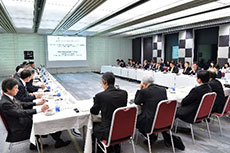 The 37th Plenary of the Hong Kong-Japan and Japan-Hong Kong Business Co-operation Committees was held in Tokyo on 28 March 2018. Some 40 senior business executives and officials from Hong Kong and Japan took part in the annual bilateral meeting
The 37th Plenary of the Hong Kong-Japan and Japan-Hong Kong Business Co-operation Committees was held in Tokyo on 28 March 2018. Some 40 senior business executives and officials from Hong Kong and Japan took part in the annual bilateral meeting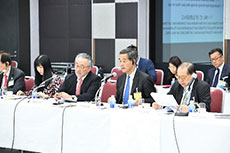 CY Leung, Vice Chairman of the National Committee of the Chinese People’s Political Consultative Conference and Former Chief Executive of the Hong Kong Special Administrative Region (front row, second right) highlighted the enormous opportunities presented to Hong Kong under the Belt and Road Initiative and Greater Bay Area development plan
CY Leung, Vice Chairman of the National Committee of the Chinese People’s Political Consultative Conference and Former Chief Executive of the Hong Kong Special Administrative Region (front row, second right) highlighted the enormous opportunities presented to Hong Kong under the Belt and Road Initiative and Greater Bay Area development plan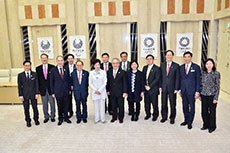 Members of the Hong Kong-Japan Business Co-operation Committee called on Yuriko Koike, Governor of Tokyo (sixth left)
Members of the Hong Kong-Japan Business Co-operation Committee called on Yuriko Koike, Governor of Tokyo (sixth left)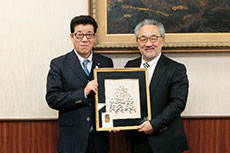 Victor Cha, Chairman of the Hong Kong-Japan Business Co-operation Committee (right) paid a visit to Ichiro Matsui, Governor of Osaka (left)
Victor Cha, Chairman of the Hong Kong-Japan Business Co-operation Committee (right) paid a visit to Ichiro Matsui, Governor of Osaka (left) 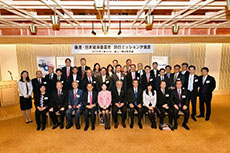 Members of the Hong Kong-Japan Business Co-operation Committee attended the welcoming dinner with representatives of industry associations in Japan in Tokyo Meiji Kinenkan
Members of the Hong Kong-Japan Business Co-operation Committee attended the welcoming dinner with representatives of industry associations in Japan in Tokyo Meiji Kinenkan The front row (from right): Yoshihiro Yamaguchi, Chief Executive Director, COO, The Overseas Construction Association of Japan, Inc. (OCAJI); Hiroshi Takada, Chairman, Organization for Small & Medium Enterprises and Regional Innovation, Japan; Margaret Fong, Executive Director, HKTDC; CY Leung, Vice Chairman of the National Committee of the Chinese People’s Political Consultative Conference and Former Chief Executive of the Hong Kong Special Administrative Region; Victor Cha, Chairman of the Hong Kong-Japan Business Co-operation Committee; Mizuho Onuma, Parliamentary Vice-Minister of Health, Labour and Welfare; Victor Chu, Chairman, First Eastern Investment Group; Koji Omi, Founder and Chairman, Science and Technology in Society Forum; Kuninori Matsuda, Ambassador and Consul-General, Consulate- General of Japan in Hong Kong; Shirley Yung, Principle Representative, Hong Kong Economic and Trade Office (Tokyo) HKSAR.
4 July 2018 – The 37th Plenary of the Hong Kong-Japan and Japan-Hong Kong Business Co-operation Committees was held on 28 March in Tokyo, with China business opportunities a key focus of the discussions.
Some 40 senior business executives and officials from Hong Kong and Japan took part in the annual bilateral meeting, which was jointly chaired by Victor Cha, Chairman of the Hong Kong-Japan Business Cooperation Committee and Deputy Chairman and Managing Director of HKR International Limited, and Katsunori Nagayasu, Chairman of the Japan-Hong Kong Business Cooperation Committee and Senior Advisor of The Bank of Tokyo-Mitsubishi UFJ, Ltd.
Hong Kong-Japan partnership
In his opening remarks, Mr Cha noted that trade is central to Hong Kong and Japan has remained Hong Kong’s fourth-largest trading partner with a trade volume of US$ 49 billion in 2017, accounting for 4.8 per cent of Hong Kong’s total trade. He emphasised Hong Kong’s long-standing advantages as an international business hub, adding that, “ASEAN is Hong Kong’s second-largest trade partner after the Chinese mainland, whereas Japan has a long history of successful business investments in the region. We will have lots of valuable discussions about the growing opportunities in the future in this region.”
Mr Nagayasu said, “Under the Belt and Road Initiative, Hong Kong will play an important role in finance as well as logistics. There is great potential in various scopes for us to work closely together. Many Japanese companies see Hong Kong as a major market for encouraging business growth.” He also pointed out that it is crucially important for Japan and Hong Kong to deepen mutual understanding to lead the way for growth and development in the region.
Members were briefed on the potential collaboration opportunities in several aspects including finance, tourism infrastructure and logistics.
Booming opportunities in China
During the session on the Belt and Road Initiative and the Guangdong-Hong Kong-Macao Bay Area, CY Leung, Vice Chairman of the National Committee of the Chinese People’s Political Consultative Conference and Former Chief Executive of the Hong Kong Special Administrative Region, shared his insights on Hong Kong’s roles. He cited China’s President Xi Jinping that Hong Kong is an important node for the Belt and Road Initiative, “We do have the combined advantages of ‘one country’, Hong Kong being part of China, and ‘two systems’, Hong Kong practicing another system, so we are a good connector and we would like to go out with Chinese mainland companies to other countries including Japan, and we would like to go into the Chinese mainland with our foreign business partners.”
Mr Leung highlighted the enormous opportunities presented to Hong Kong under the Greater Bay Area development plan. With a combined population of 68 million and a total GDP equivalent to about 12.2 per cent of the Chinese mainland, the Greater Bay Area will be developed into a world-class city cluster with global competitiveness. “The opening up of markets will promote the free flow of goods, products, technology and services within the area.” He added that Hong Kong and Japan can tap into the new opportunities together: “Using Hong Kong as a base, Japanese businesses can explore cooperation opportunities in projects related to infrastructure and technology, etc. in the Bay Area.”
Japan’s economy on a growth path
At the Japan Economic Updates session, Hidekazu Horikoshi, Director and President of Bank of Tokyo-Mitsubishi UFJ (China) Ltd, pointed out that Japan’s economy is now in a cyclical expansionary phase and the growth performance is supported by the robust growth in exports and private sector capital investment. In response to the major challenges of declining birth rate and ageing population, the Japanese government put forth a new economic policy package based on the idea of “Society 5.0”, an initiative to utilise technology to resolve critical social challenges. He said both the private sector and the government have to work closely together to promote sustainable economic growth.
Regional cooperation
During the session themed “Asian Growth Strategies and New Opportunities”, Margaret Fong, Executive Director of the Hong Kong Trade Development Council (HKTDC), highlighted the importance of Hong Kong-Japan partnership while seizing market opportunities in the ASEAN region. As Japan and Hong Kong are both major foreign investors in ASEAN, she expects investment from both regions to accelerate. “We have built a long-standing cross-border business relationship with ASEAN and a number of international brands also partner with us to access these markets. It makes a lot of sense for us to work together to bring Japanese products into this thriving consumer market.” She also cited the Free Trade Agreement (FTA) signed between Hong Kong and ASEAN: “Our FTA covers trade in goods, services, investment, economy and technical cooperation, so it is quite a wide-ranging agreement.” She said there are many areas in which Japanese companies can expand their partnership with Hong Kong to tap into the ASEAN market.
Ms Fong said the HKTDC is a comprehensive platform for Japanese businesses to open up new markets. “We have already seen a thousand Japanese companies coming to our various trade fairs and events to meet partners from around the world, in which ASEAN is always the key market for our buyers.” As infrastructure development is the key factor driving economic growth under the Belt and Road Initiative and the Bay Area development plan, she said the HKTDC has been launching a series of promotions and initiatives to bring SMEs to the Chinese mainland and emerging markets to explore the potential of infrastructure investment.
The HKTDC serves as the secretariat for the Hong Kong-Japan Business Co-operation Committee, while Keidanren is the secretariat for the Japan-Hong Kong Business Co-operation Committee. The two committees will hold their 38th Plenary session next year in Hong Kong.
